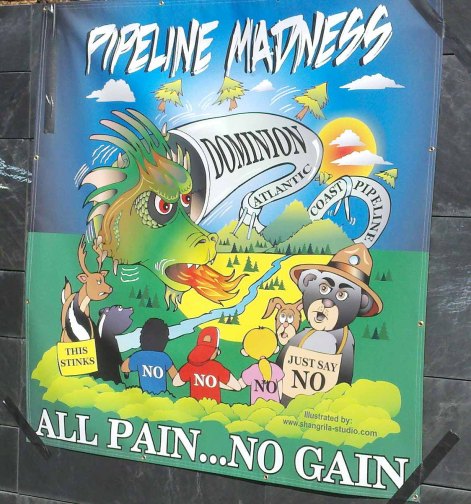By Ivy Main; cross posted from Power for the People VA
 Dominion Resources’ plan to use the captive ratepayers of its electricity subsidiary to guarantee a customer base for its Atlantic Coast Pipeline venture has caused critics—including me—to complain that the scheme presents a clear conflict of interest. According to a complaint filed with the Federal Trade Commission (FTC), it’s also a violation of federal antitrust laws.
Dominion Resources’ plan to use the captive ratepayers of its electricity subsidiary to guarantee a customer base for its Atlantic Coast Pipeline venture has caused critics—including me—to complain that the scheme presents a clear conflict of interest. According to a complaint filed with the Federal Trade Commission (FTC), it’s also a violation of federal antitrust laws.
Lawyer Michael Hirrel, who retired last year from the Antitrust Division of the U.S. Department of Justice, has asked the FTC to investigate “whether ACP’s project constitutes a prohibited monopolization by Dominion, Duke and Piedmont, under Section 2 of the Sherman Act, and an unfair method of competition, under Section 5 of the Federal Trade Commission Act.”
Dominion Virginia Power is currently engaged in an aggressive build-out of natural gas generating plants, with three new units representing 4,300 megawatts of generating capacity, coming online between 2014 and 2019. The company’s latest integrated resource plan and presentations to stakeholders reveal plans for over 9,000 megawatts more. By comparison, the company has promised a mere 400 megawatts of solar.
Where there are gas plants, there must be gas, and this massive build-out means a guaranteed stream of income for the lucky owners of gas transmission pipelines. The fact that one such pipeline is partly owned by Dominion Virginia Power’s parent corporation is clearly a conflict of interest. Because Dominion holds a monopoly on electricity sales, its customers will be stuck paying for gas—and guaranteeing a revenue stream for pipeline owners—for decades to come.
This is a bad deal for customers and the climate, but according to Hirrel, it is also anticompetitive and warps the normal decision-making of the companies involved.
(In addition to Dominion Resources, the other owners of the Atlantic Coast Pipeline are Duke Energy, Piedmont Natural Gas and AGL Resources. AGL is being acquired by Southern Company, meaning three of the four partners own electricity subsidiaries that are regulated monopolies that can stick ratepayers with the cost of paying for gas. As for the fourth partner, Piedmont is a regulated monopoly distributor of natural gas. Just to make things even more cozy, Piedmont is being acquired by Duke.)
Hirrel’s complaint notes: “If Dominion, Duke and Piedmont were to acquire their gas and its transportation, plus electricity generation, in competitive markets, they would, the Commission must suppose, engage in a very different decision making process. But that process will be rendered moot when they acquire and transport their own natural gas, and generate their own electricity. They will distribute the electricity and gas to their own monopoly retail customers, who have no alternative. Those customers must pay the costs of Dominion, Duke and Piedmont’s decisions, whether the costs were efficiently assumed or not.”
Hirrel also points out that in a truly competitive market, Dominion and Duke might not pursue a natural gas strategy at all, because of the economic risks involved. They might, for example, consider whether investments in wind and solar would be more economical and avoid the potential for stranded investments.
“But in the present universe,” he concludes, “the one in which Dominion, Duke and Piedmont propose to become the monopoly suppliers of the inputs for their own monopoly customers, they need not engage in any such economically efficient decision making process. If they make bad decisions, they will not suffer. The costs of those bad decisions will be borne by the monopoly customers of their retail electricity and natural gas distribution systems.”
I called Mr. Hirrel to ask what action he expects the FTC to take. He says the Commission typically takes anywhere from two weeks to two months to determine whether to open an investigation when it receives a complaint like this. If it chooses to investigate, it may also ask the Federal Energy Regulatory Commission (FERC) to delay its approval process for the ACP pending conclusion of the FTC investigation.
Hirrel copied FERC on his complaint, making it a public document within the ACP docket (CP15-554).


![Sunday News: “Trump Is Briefed on Options for Striking Iran as Protests Continue”; “Trump and Vance Are Fanning the Flames. Again”; “Shooting death of [Renee Good] matters to all of us”; “Fascism or freedom? The choice is yours”](https://bluevirginia.us/wp-content/uploads/2026/01/montage011126.jpg)

![VA DEQ: “pollution from data centers currently makes up a very small but growing percentage of the [NoVA] region’s most harmful air emissions, including CO, NOx and PM2.5”](https://bluevirginia.us/wp-content/uploads/2026/01/noxdatacenters.jpg)
![New Year’s Day 2026 News: Full Video of Jack Smith Testimony – “The attack that happened at the Capitol…does not happen without [Trump]”; Trump/RFK Jr Make Measles Great Again; Right-Wing YouTuber Nick Shirley Definitely Not a Real Journalist; Musk Did Enormous Damage in 2025](https://bluevirginia.us/wp-content/uploads/2026/01/montage010126.jpg)












